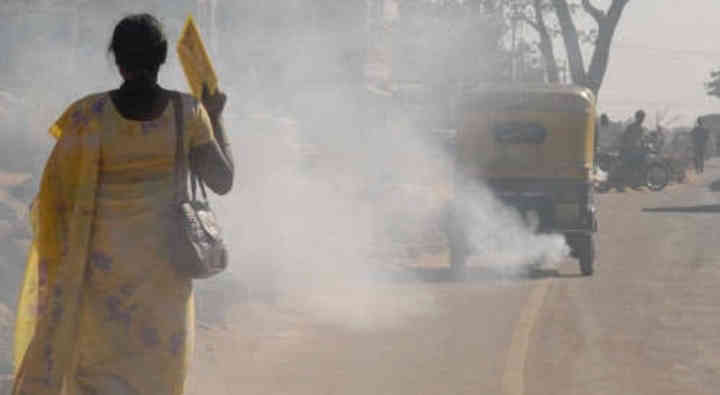Air pollution has become one of the most pressing environmental and public health challenges in Nigeria. From the bustling streets of Lagos and Port Harcourt to smaller towns affected by industrial emissions and open waste burning, millions of Nigerians are exposed daily to dangerous levels of pollutants that threaten their health.
TJ News Nigeria reports that studies conducted by international health bodies and Nigerian environmental agencies reveal that air pollution is now a leading cause of respiratory illnesses, cardiovascular diseases, and premature deaths in the country. The problem is compounded by rapid urbanization, population growth, and weak enforcement of environmental regulations.
- Best HMOs and Health Insurance Plans in Nigeria: What They Cover and What to Avoid
- Chronic Kidney Disease in Nigeria: Causes, Symptoms, Prevention and Treatment Options
This article explains the sources of air pollution in Nigeria, its health consequences, and the steps individuals and authorities can take to reduce exposure and protect lives.
What Is Air Pollution?
Air pollution occurs when harmful substances contaminate the atmosphere. These substances, known as pollutants, can be solid particles, liquid droplets, or gases. Common examples include carbon monoxide, nitrogen oxides, sulfur dioxide, and particulate matter (PM2.5 and PM10).
In Nigeria, air pollution levels in urban areas often exceed the safe limits recommended by the World Health Organization (WHO). The high concentration of pollutants makes cities like Lagos, Onitsha, and Port Harcourt some of the most affected in sub-Saharan Africa.
Major Sources of Air Pollution in Nigeria
1. Vehicle Emissions
The increasing number of cars, buses, and motorcycles—many of them old and poorly maintained—contribute heavily to urban air pollution. In Lagos alone, thousands of commercial vehicles release exhaust fumes daily, adding to the toxic air mix.
2. Industrial Activities
Factories, refineries, and power plants emit harmful gases and particulate matter into the air. Port Harcourt, for example, has experienced the “black soot” crisis, where constant emissions from illegal refining and industrial activity covered homes, cars, and entire neighborhoods.
3. Open Burning of Waste
The widespread practice of burning household and commercial waste in open spaces releases toxic smoke. Many communities without proper waste management rely on open burning, increasing exposure to harmful pollutants.
4. Indoor Air Pollution
The use of firewood, charcoal, and kerosene for cooking in poorly ventilated homes is a major source of indoor air pollution. Women and children are particularly at risk, as they spend more time near cooking areas.
5. Natural and Environmental Factors
Dust storms, especially from the Sahara, contribute to seasonal spikes in particulate matter levels. Climate change has also worsened air quality through changes in rainfall patterns and increased desertification.
Health Effects of Air Pollution
Exposure to polluted air has both short-term and long-term health consequences.
Short-Term Effects
- Irritation of the eyes, nose, and throat.
- Coughing, wheezing, and shortness of breath.
- Increased frequency of asthma attacks.
- Reduced lung function during heavy pollution episodes.
Long-Term Effects
- Respiratory diseases: Chronic bronchitis, emphysema, and chronic obstructive pulmonary disease (COPD).
- Cardiovascular problems: High blood pressure, heart disease, and stroke.
- Cancer: Prolonged exposure to polluted air, especially with industrial emissions, is linked to lung cancer.
- Reduced life expectancy: Studies estimate that air pollution reduces the average lifespan of Nigerians, particularly in urban centers.
- Child health risks: Children exposed to polluted air are more likely to suffer from pneumonia and impaired lung development.
Most Affected Groups
While air pollution affects everyone, certain groups are more vulnerable:
- Children: Developing lungs are more sensitive to toxins.
- Older people: Pre-existing conditions make them more susceptible to complications.
- Pregnant women: Exposure increases risks of low birth weight and premature birth.
- Outdoor workers: Traffic officers, street traders, and transport workers inhale polluted air daily.
Air Pollution Hotspots in Nigeria
- Lagos: Vehicle emissions, industrial activities, and open waste burning.
- Port Harcourt: The black soot crisis linked to illegal refining and gas flaring.
- Kano and Onitsha: High population density, dust storms, and uncontrolled traffic emissions.
- Rural communities: Indoor air pollution from cooking fuels remains widespread.
Reducing Exposure to Air Pollution
Individuals can take the following steps to protect themselves:
- Use protective masks when air quality is visibly poor.
- Improve ventilation indoors to reduce indoor smoke buildup.
- Switch to cleaner cooking fuels such as gas or electricity where possible.
- Avoid outdoor exercise during high pollution periods.
- Plant trees around homes and communities to improve air quality.
Government and Policy Actions Needed
Experts recommend that Nigerian authorities strengthen regulations and introduce stricter monitoring systems. Priority actions include:
- Enforcing vehicle emission standards.
- Expanding public transport systems to reduce reliance on old vehicles.
- Investing in waste management infrastructure to eliminate open burning.
- Monitoring industrial emissions and penalizing violations.
- Expanding renewable energy and reducing reliance on firewood and kerosene.
- Conducting regular air quality assessments and publishing results for public awareness.
International Comparisons
Globally, countries such as India and China have faced similar pollution crises but have improved conditions through stricter regulations, promotion of electric vehicles, and expansion of renewable energy. Nigeria could adopt similar models while tailoring them to local realities.
Public Health Recommendations
Health experts stress the importance of early diagnosis and treatment of pollution-related illnesses. Routine lung and heart health screenings, especially in urban centers, should be encouraged. Public awareness campaigns can also reduce risky practices such as open burning and indoor cooking with unsafe fuels.






